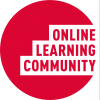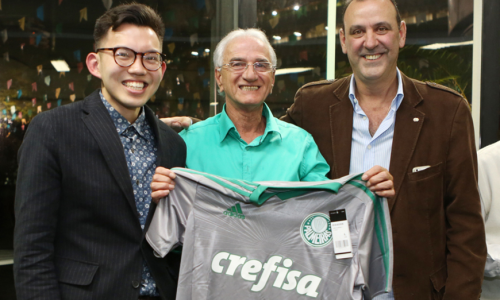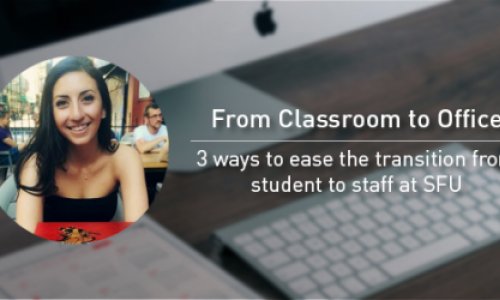
A successful Co-op work term can involve many factors, one of which is developing and working towards meeting your learning objectives. Through the excitement, stress and time crunch of starting a new Co-op work term, thinking about developing and noting down your learning objectives might be the last thing on your mind but it is an important component of your work term. It helps you to think about what you want to accomplish during your upcoming work term and begin developing a plan for how you’ll achieve success.
What are “Learning Objectives"?
What, exactly, are “learning objectives" as they relate to your Co-op work term?
Your work term is meant to be a learning opportunity and learning objectives are one way to help focus your on-the-job learning towards specific outcomes or goals. A learning objective is a written statement describing specific, attainable and measurable achievements and the steps you will take to accomplish them during your Co-op work term.
Example:
“By the end of my Co-op work term, I will improve my Adobe InDesign skills by requesting or proposing design assignments that are in line with my job. I will seek feedback on my design layouts from my supervisor/colleagues and will measure my success by completing at least one piece that is used by my employer and would be suitable for my portfolio."
Getting the Value from Learning Objectives?
In addition to focusing your on-the-job learning towards specific goals, preparing your learning objectives and discussing them with your supervisor(s) and Co-op Coordinator can also benefit you in some of the following ways:
-
Meeting with your supervisor(s) to discuss your learning objectives can start off your work term on a professional note, showing your supervisor(s) that you are approaching your work term seriously and taking responsibility for your own learning.
-
Your supervisor(s) may know of additional training and/or professional development opportunities that you can undertake while on the job that could help you work towards achieving your objectives.
-
Your Co-op Coordinator will often refer back to your learning objectives during your mid-semester site visit and help you with strategies to employ during the remainder of your work term to help you achieve your objectives before your work term comes to an end.
-
Documented learning objectives will help you update your resume and portfolio at the end of your work term and provide you with a framework to review and reflect upon your accomplishments.
Developing Your Learning Objectives
As you start your work term, you may have already completed Bridging Online II (BOL II). If not, we highly encourage you to register (through myExperience) for a BOL II session.
In BOL II, in the “Personal Management" topic, you are asked to record some of your areas for improvement in the “self reflection on self-assessment" exercise. You may want to revisit this exercise as you prepare your learning objectives for your Co-op work term.
As you start your first few days on the job, you may want to reflect upon your day-to-day activities and revisit the original job description to see what learning objectives would fit within the work you were hired to perform.
To develop your learning objectives you may also want to ask yourself some of the following questions:
-
What do I want to accomplish on this work term?
-
What steps will I take to accomplish my objectives?
-
How will I know if I’ve been successful in accomplishing my objectives?
-
When will I accomplish my objectives by?
Can’t remember all those questions? Here is an easy acronym to remember as you develop your learning objectives:
Your learning objectives should be “SMART":
-
S – Specific
-
M – Measurable
-
A – Action Oriented
-
R – Realistic
-
T – Timely
Using the example provided under “What are Learning Objectives?" above, the questions would break down as follows:
What do I want to accomplish on this work term?
Improve my Adobe InDesign skills
What steps will I take to accomplish my objectives?
Requesting or proposing design assignments that are in line with my job, seeking feedback on my design layouts from my supervisor/colleagues
How will I know if I’ve been successful in accomplishing my objectives
Completing at least one piece that is used by my employer and would be suitable for my portfolio.
When will I accomplish my objectives by?
The end of my Co-op work term.
Employment Competencies
If you are seeking some inspiration for potential learning objectives, we encourage you to review the “Learning Objectives Guidelines" in the documents folder in myExperience. These guidelines outlines some core employment competencies to base your learning objectives on.
Some of the employment competencies include: technical, communication, problem solving, professionalism, teamwork and leadership.
Additional Examples
Learning objectives can address both technical skills and “soft" skills. We’ve provided some additional examples of both types below to help you get inspired to document your own specific learning objectives.
The following examples were generously submitted by Engineering Science Co-op Coordinator Heather Keeping and are outlined as per the learning objective sections listed in myExperience:
Learning Objective: Learn the processes involved in nanofabrication and the applications of nanotechnology.
Tasks/Strategies: Work in the lab with experts and gain experience with the systems used in fabricating nanotechnology.
Evaluation: I will have enhanced this knowledge by the end of my work term if I know how all of the tools work and what their role is in the fabrication procedure.
Learning Objective: How to use the TSW error logging tool.
Tasks/Strategies: I will read the appropriate documentation and consult with my team members about the use of the tool.
Evaluation: I will measure my success by how easily I can use the tool, how comprehensively I understand its operation, and how well I am able to troubleshoot issues with it.
Learning Objective: Improve my verbal communication skills.
Tasks/Strategies: Speak up during group/team meetings, ask my supervisor questions and volunteer to participate in any potential presentations.
Evaluation: I will measure my success by my comfort level with proactively asking questions and contributing during team meetings.
So how will you be able to tell if you’ve had a successful work term? Refer back to your learning objectives, reflect on how many you were able to achieve during your time on the job and what else you want to learn in future work terms!















